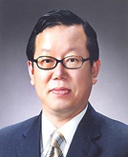의료기기산업학과 입학생을 지도할 수 있는 교수진 명단은 아래와 같습니다. 입학 지원시 해당 교수의 프로필 및 연구분야를 반드시 확인하시기 바랍니다.
| 연구실 교수 / |
 이름 : 연구실
소속 :
직급 :
캠퍼스 :
연구실 : Glycobiology Laboratory
이름 : 연구실
소속 :
직급 :
캠퍼스 :
연구실 : Glycobiology Laboratory/김철호 교수 E-mail : wonhh@skku.edu Homepage : www.glycobio.org 실험실명 : 참여학과 : 의료기기산업학과 인쇄하기 |
|
■ Research objective
Functional glycobiology and glycomic studies on human diseases and biodiversity by supra molecular system and establishment of novel industrial basis. Change of the cell surface glycosylation is one of the most important modifications that occur in cellular transformation such as development, differentiation, growth, aging, immune system and oncogenesis. Membrane domain is a transient supra-molecular organization assembled by specific glycoconjugates and sphingolipids. Although domain formation is promoted by purely physical interactions between components, synthesis and distribution of these components are under strict genetic control. Both glycoproteins and glycolipids carbohydrate moieties are affected by cellular transformation, leading to the appearance of carbohydrate tumor associated antigens. These changes in glycosylation have been described for a large number of cancer types and are usually associated with a poor prognosis for the patients. Modifications of cellular glycosylation are a common phenotypic change in malignancy. However, only a limited number of biosynthetic pathways are frequently altered in cancer. ■ Research interests A)glyco-chain expression Glyco-chains are biological chain-structures composed of monosaccharides, like galactose and glucose. Structural diversity of glyco-chains contributes to the efficiency of signal diciphering and transmission. Supra-biomolecular system composed of several membrane molecules through non-covalent bonding is recently recognized to play important roles for the signaling, and glyco-chains are involved in this supra-biomolecular system. This research aims at the elucidation of molecular mechanisms responsible for glyco-chain expression involved in the supra-biomolecular system, and contributes to the establishing of integrative glycobiology and glycomics. (1) Expression analysis of glyco-chain related genes using DNA and Proteomic microarray. (2) Studies on the molecules controlling the expression of sialic acid species. B)glyco-chain function Sialic acid is transferred from CMP-sialic acid to an acceptor glycan through the catalysis of sialyltransferase. Some of glyco-chains on cellular surface are regarded to be potential signaling molecules in cellular communications. Glyco-chains are biosynthesized through the catalysis of membrane-bound glycosyltransferases. We would like to address the pathological significance of glycosyltransferase function and resulting abnormalities of glyco-chain metabolism. We also hope to apply our future results for developing new diagnostic means and therapeutics of the disease. (1) Analysis on controlling mechanisms of glyco-chains through glycosyltransferases. (2) Functions of glyco-chains in the cancer biology and immune systems. C)sphingolipid expression and function Sphingolipids and glycolipids are a family of biomembrane components. Supra-biomolecular system including sphingolipids and glycolipids is considered to play important roles for signal transduction. This research team focuses on enzymes involved in the sphingolipid and glycolipid biosynthesis by means of biochemistry and molecular biology and try to modulate functions of membrane bound molecules by manipulating sphingolipids and glycolipids. The development of micro-analysis by mass spectrometry for glycolipids and glycopeptides is also the subject of this research team. We hope our study eventually leads to the establishment of an innovative industrial basis such as "domain sensor". (1) Studies on enzymes regulating sphingolipid expression. (2) Functional modulation of membrane molecules with sphingolipids. (3) Establishment of micro-analysis of sphingolipids. (4) Role of lipid domains in the endocytic pathway. ■ Contact wonhh@skku.edu |